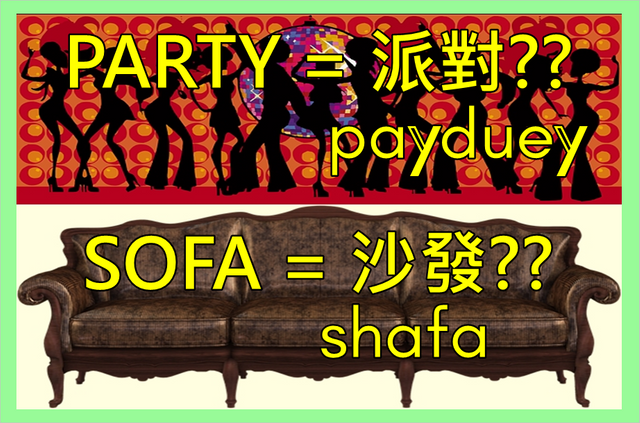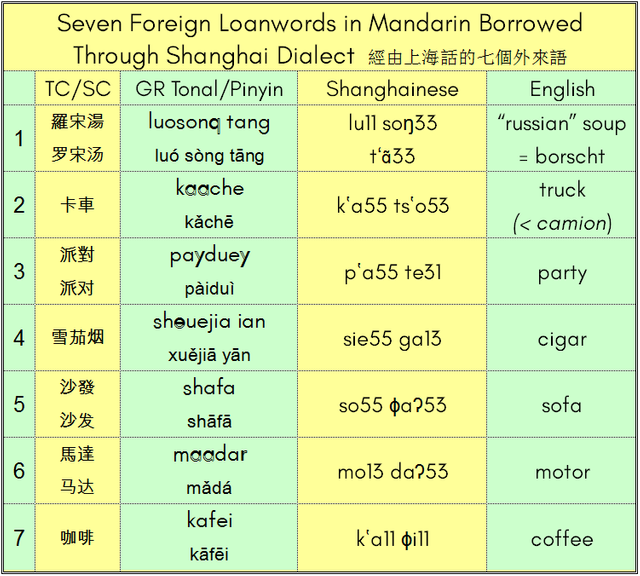
Words such as 巧克力 qiǎokèlì / cheaukehlih are easy to recognize and remember. But what about “weird” loans such as 沙發 shāfā / shafa and 派對 pàiduì / payduey?
Foreign learners quickly figure out that compromises must be made: foreign loanwords are created by a clever mixture of adaptations to the Chinese sound system and Chinese rules for word formation.
(A) chocolate = 巧克力 cheaukehlih (note: syllable-final -h is a 4th tone marker)
(B) banjo becomes 班卓琴 banjwochyn : the first two syllables are transliterations of ban and jo and the 3rd syllable, chyn, is a semantic specifier: a string instrument.
(C) bandage = 綳帶 bengday , beng “stretch” + day “ribbon”. This loanword is especially clever: it is both a transliteration (a Chinese word that sounds like “bandage”) and a translation “a stretchy ribbon”
The problem with loanwords such as 沙發 shafa and 派對 payduey is that Chinese seems to have perfectly good alternative choices:
Why wasn’t “sofa” adopted as 嗖發 sōufā / soufa or 索發 suǒfā / suofa, which sound much closer?
By the same token, why wasn’t “party” rendered as 爬踢 pátī / parti ([literally] “crawl and kick”), which implies dancing, or even just 琶緹 pátí / partyi, which at least sounds much more similar to “party” than the somewhat odd-sounding (but vaguely meaningful: “[literally] assign couples”) combination 派對 payduey .
Questions about etymology are quite common among foreign learners of Chinese, but native-speaking teachers of Mandarin (who usually don’t speak any other dialects and don’t have any clear concept of interdialectal borrowing) are usually incapable of providing convincing answers.
I have been asking such questions all of my life, and I am very happy to present the results of my recent research. It turns out that the presence of seemingly “illogical” or “unreasonable” loanwords in Mandarin is the result of dialectal borrowings.
During the 19th and early 20th century, foreign foods, customs and inventions first arrived in China’s treaty ports. Because standardized Mandarin (what was later called 國語 guóyǔ / gwoyeu and 普通話 pǔtōnghuà / puutonghuah) had not yet been adopted, it was quite natural for Chinese people in the treaty ports to devise dialectal equivalents for foreign words.
Shanghai was a trendsetter for the rest of China (the Chinese Communist Party, for example, was established in Shanghai), so standardized Mandarin later adopted quite a few words which were originally created or borrowed in Shanghai.
https://en.wikipedia.org/wiki/Communist_Party_of_China#Founding_and_early_history_(1921%E2%80%931927)
Because Chinese syllables never end in double consonants (CV, open syllables that consist of a consonant and a vowel are the most common syllable type), words such as borscht /bɔrʃt/ (https://en.wikipedia.org/wiki/Borscht) are very hard for Shanghainese and other Chinese to pronounce.
(1) Borscht “Russian soup” thus became known as 羅宋湯 /lu11 soŋ33 tʻɑ͂33/, 羅宋 = “Russian" + 湯 = soup, which is much easier for Chinese to pronounce and remember.
(2) Trucks were called 卡車 /k‛a55 ts‛o53/, a phonetic-semantic compound, where 卡 ka is the first syllable of camion /kamjo͂/, the French word for “truck”, and 車 means “vehicle”.
(3) The phonetically odd-seeming 派對 payduey (from a Mandarin point of view; notice the d- and the -uey) when pronounced in Shanghainese comes out as /p‛a55 te31/, which is much closer to the English word “party”.
(4) “Cigar” in Shanghainese is /sie55 ga13/, a reasonable facsimile of “cigar” + 烟, a semantic specifier.
(5,6) The “o” sound in “sofa” and “motor” both come out as “o” in Shangainese: 沙發 /so55 ɸaʔ53/ and 馬達 /mo13 daʔ53/
(7) The last Shanghai borrowing in today’s post is 咖啡 /k‛a55 ɸi55/, much closer to the English name for the beverage than the Mandarin pronunciation, which sounds like French.

I always thought these words came from Cantonese ☺️😊☺️
Downvoting a post can decrease pending rewards and make it less visible. Common reasons:
Submit
The history of Shanghai, coupled with the phonetic clues I picked out, make it quite likely that these particular words came from Shanghainese rather than Cantonese, which is itself a very rich source of foreign loanwords (to be covered in a future post).
Thank you for the comment!
Downvoting a post can decrease pending rewards and make it less visible. Common reasons:
Submit
Absolutely fascinating! I often wonder about certain English etymologies as well. You have been very thorough and clear, thanks for this 😁👍
Cg
Downvoting a post can decrease pending rewards and make it less visible. Common reasons:
Submit
Thank you for this very encouraging comment. It is quite rare to receive authentic feedback from anybody who has actually read the content of my posts, especially Chinese language related posts.
Downvoting a post can decrease pending rewards and make it less visible. Common reasons:
Submit
I have corrected a few minor errors in the text and both graphics. Thanks again for the comment!
Downvoting a post can decrease pending rewards and make it less visible. Common reasons:
Submit
Hat tip to @catwomanteresa, whose sharp eyes spotted a mistaken character in my Chinese text. I have corrected this and a few other minor errors in the text and accompanying graphics.
Downvoting a post can decrease pending rewards and make it less visible. Common reasons:
Submit
羅宋娃娃 lol
Downvoting a post can decrease pending rewards and make it less visible. Common reasons:
Submit
Congratulations @wentong-syhhae! You have received a personal award!
Click on the badge to view your Board of Honor.
Downvoting a post can decrease pending rewards and make it less visible. Common reasons:
Submit